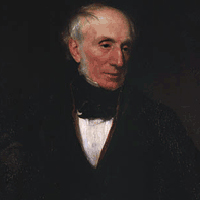Strange Fits of Passion Have I known by William Wordsworth: Summary and Analysis
This poem was written in Germany in 1799 and published in 18O0. The character Lucy is found in many of his poems. She is presented as a symbolic lover, and sometimes as a pure and innocent love of a child or a father. In most of his poems, he loses Lucy. This loss of Lucy may be symbolic of some of the losses of his real life.

William Wordsworth (1770-1850)
The poet's affectionate love for Lucy leads him to fear an omen about her death, viz., the moon suddenly setting. The other Lucy poems show that the lover's omen is confirmed. 'Strange Fits of Passion Have I Known' describes the lover making his way to Lucy's cottage 'Beneath an evening-moon'. The lover fixes his eyes on the moon, which 'descended still', and is in a waking sleep, but suddenly realizes that the moon has gone down behind Lucy's cottage. This immediately fills him with fear that Lucy may be dead.
The poem works well on several levels. Simply as a story with supernatural overtones, it is effective. But it is also effective in the sphere of psychological poetry as it shows the reader how a sudden shock, an awareness, may alter understanding and force an awareness of time and the speed of its passing. It is the sudden disappearance of the moon, whilst he is 'In one of those sweet dreams...Kind Nature's gentlest boon', that so frightens the lover, The gentle sleep may represent our lack of awareness of the passing of time, the approaching proximity of death, and the sudden descent of the moon the shock which awakes our realization. In addition, Lucy is described in natural images — ‘Fresh as a rose in June’-which emphasizes her beauty but also her vulnerability. Roses must soon wither and die.
The short poem “Strange fits of passion have I known” is a ballad with the ABAB rhyme scheme. The speaker has been a victim of fits of passion which means a moment of strange fear of losing someone or something. Before telling his story he states only a lover can understand him and his feeling. He goes on telling that once he made a journey to Lucy’s cottage. While moving he noticed the moon. It was also moving with the speaker, but suddenly it disappears behind Lucy’s cottage and in fear he hopelessly assumes that Lucy may be dead.
The speaker compares Lucy to a blooming rose of June which eventually withers away. This comparison is an ironic because he fails to realize that one day sooner or later the rose fades away and Lucy too whom he only sees as a blooming rose existing from day to day. The projection of the 'evening moon' further adds strength to this theme of perish. When the lover notices the sinking moon, he ironically compares her to the Rose, whom he assumes will never fade away.
The repeated use of the 'evening-Moon', the 'sinking moon' and the 'descending moon' focuses on the universal truth of decay or death that each and every living creature has to face, but the poet is denying to accept that fact. The poet is unconscious in a sense that he just believes what his eyes see. When the moon suddenly disappears, the poet becomes unnaturally conscious of the universal law of death and doubts if Lucy may be dead. He then realizes that the 'Rose is June' has the same unavoidable fate to wither as the moon is fated to set. But it is not to be forgotten that every setting has its shinning and every death has life.
Wordsworth has a unique mastery over technique to incorporate the unspeakable feelings of fear that everyone suffers from time to time. The technique is storytelling. He did not simply put the events of the story one after another, but makes the reader feel the fate of the lover too. The readers easily identified themselves with the poet in this poem.
As the poem is written in the ABAB ballad form it is almost like a nursery rhyme. It is lulling and comforting in tone. Though some lines are shocking and horrible, it continues to lull in the ballad form.
Cite this Page!
Sharma, K.N. "Strange Fits of Passion Have I known by William Wordsworth: Summary and Analysis." BachelorandMaster, 25 July 2017, bachelorandmaster.com/britishandamericanpoetry/strange-fits-of-passion-have-i-known.html.
Related Topics
My Heart Leaps up when I Behold
Ode: Intimations of Immortality
A Slumber Did My Spirit Seal (Lucy Poem)
"I Travell'd Among Unknown Men" (Lucy Poem)
She Dwelt Among the Untrodden Ways (Lucy Poem)
Three Years She Grew in Sun and Shower (Lucy)
Biography of William Wordsworth
 |
bachelorandmaster.com |